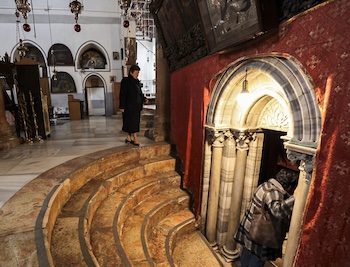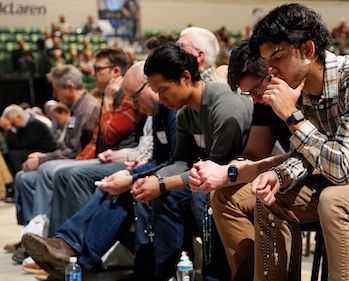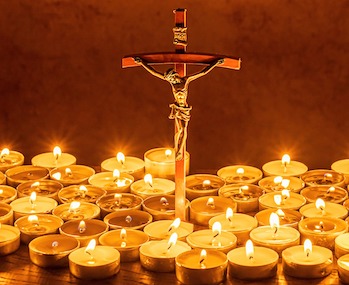The little town of Bethlehem usually teems with pilgrims this time of year, but the Holy Land remained closed to international visitors for a second Christmas in a row due to the pandemic.
A Christian organisation doing relief work in the Middle East – is urging people to visit the Holy Land as communities struggle to make ends meet during the pandemic.
Israel has largely barred foreign visitors since the pandemic first hit in March 2020. After gingerly allowing in test groups, it allowed fully vaccinated tourists in early November.
But the gates abruptly closed again four weeks later with the emergence of omicron. Access is also barred to the occupied territories — including the West Bank town of Bethlehem — where entry and exit are controlled by Israel.
UK Friends of the Holy Land told media about the challenges people are facing in areas of Israel where tourism once flourished.
Only a few hundred thousand foreign nationals visited in 2020 compared with more than 4.5 million in 2019, a bumper year for tourism when Christian pilgrims accounted for roughly one-quarter of the influx.
The usually bustling Holy Land could be in for an incredibly quiet Easter too – a time of the year where you often cannot even book a stay due to the number of people visiting.
Many of those that pilgrimage to the Holy Land are within Covid “high risk” age groups, and some may have been put off by Government advice suggesting people do not visit certain areas of Israel, including Gaza.
Brendan Metcalfe from UK Friends of the Holy Land is urging people to take the opportunity for a quieter visit, and embark on a pilgrimage.
He said: “”The challenge, to some extent is that the typical person who goes on pilgrimage tends to be the older generation and they seem to be the ones who have been a little bit more cautious at the moment. But I would say to anybody that you know, in normal times, Easter week in Jerusalem is absolutely rammed. Your chances of going and getting a booking and visiting Jerusalem for Easter, you would need to book up at least a year beforehand. I would imagine this is going to be one of those years where if you want to go, it’s a perfect opportunity where people effectively come off the fence and say ‘yes, we can go and visit now.’
“The Christmas just past the second Christmas where Bethlehem has not had any foreign visitors, and that is the lifeblood of so many people; not only the people who directly work in tourism, the bus drivers or taxi drivers, the people in the hotels, but also the people who support those industries – the people who who do the vegetable growing for the hotels, who carve the souvenirs, who do the cleaning.
“It’s been calculated that it’s about 72 to 80 per cent of the people in Bethlehem, and around the same level in Jerusalem and Nazareth, who are dependent on tourism.
“It’s very important that we engage with the Mother Church, the place of our where our faith was founded. So if you ever thought of going, this is a perfect time to go because it won’t be busy. So if you want to experience Easter, in Jerusalem, this is a perfect time to go.
Foreign visitors were mostly barred last Christmas, when Israel and the Palestinian Authority, which exercises limited self-rule in parts of the West Bank, were heading into a new spike of infections. The Old City, in predominantly Palestinian, Israeli-annexed East Jerusalem, is still feeling the effects of all of the pandemic-era restrictions. Official data indicated a decrease in monthly hotel occupancy rates in Jerusalem to 30% in October 2021, from 76% in October 2019.
Tiberias and Nazareth, prime destinations in northern Israel for Christian pilgrims, also saw sharp decreases. According to the Israel Hotel Association, Nazareth’s occupancy rate plummeted to 13% this fall, from 80% in fall 2019.
And Bethlehem, venerated as the traditional birthplace of Jesus, had another gloomy season.
Anton Sabella, the owner of a new business in the Old City’s Christian Quarter, The Gateway bookshop and wine bar, told media that tourism from abroad would probably not fully recover in the foreseeable future, so he was thankful for the support of local Palestinians as well as some Israeli Jews and expatriates who venture into the area.
“So far,” he said, “we are hanging in there.”
A small Christmas market attracts local residents of all religions who want a taste of the holiday. At Santa’s house, Kassissieh, a Palestinian Christian, received groups from around the country. He said he had 14,000 visitors last December and was expecting about as many this year.
There may be few tourists, but Kassissieh at least brings some Christmas spirit.
“Last year, I saw how stressed the children were,” he said. “I saw on their faces that I brought some life back to them.”
(Agencies; with inputs from the New York Times)













